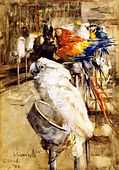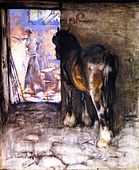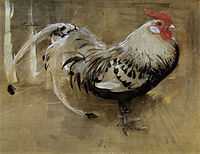Joseph Crawhall III
| Joseph Crawhall | |
|---|---|
.png) | |
| Born |
20 August 1861 Morpeth, Northumberland |
| Died |
24 May 1913 London |
| Nationality | British |
Joseph Crawhall (20 August 1861 – 24 May 1913[1]) was an English artist born in Morpeth, Northumberland.
Life
Crawhall was the fourth child and second son of Joseph Crawhall II and Margaret Boyd. Crawhall specialised in painting animals and birds. He was born 20 August 1861 at Morpeth, Northumberland. He trained at King's College London before going to Paris to work with Aimé Morot in 1882.[2]
In the 1880s and 1890s, his work became associated with the Glasgow Boys. He was strongly influenced by the Impressionists, and, like them, his work was rejected by the Establishment, in his case in the form of the Royal Scottish Academy.
In the 1880s he travelled throughout Morocco and Spain, abandoning oil painting and moving to watercolours with a lighter palette. He died in London.
Legacy
Many of his works are viewable in the Kelvingrove Art Gallery and Museum and in the Burrell Collection. He has less works because he is known to have destroyed those he was unhappy with. There is a painting of him by Walter Westley Russell.[3]
-

The Aviary, Clifton, 1888
-

The Forge, by 1885
-

Bullring in Algeciras, 1891
-

The White Drake, 1895, National Gallery of Scotland
-

Spangled Cock, 1903
Notes
- ↑ Who's Who 1914, p. xxi
- ↑ "Joseph CRAWHALL 1861–1913". The Tate. Retrieved 4 July 2013.
- ↑ Paintings by Joseph Crawhall at the BBC Your Paintings site
|
External links
| Wikimedia Commons has media related to Joseph Crawhall. |
- Works by Joseph Crawhall III at Project Gutenberg
- Works by or about Joseph Crawhall III at Internet Archive
- A selection of Crawhall's Spanish and Moroccan inspired works at the Burrell Collection